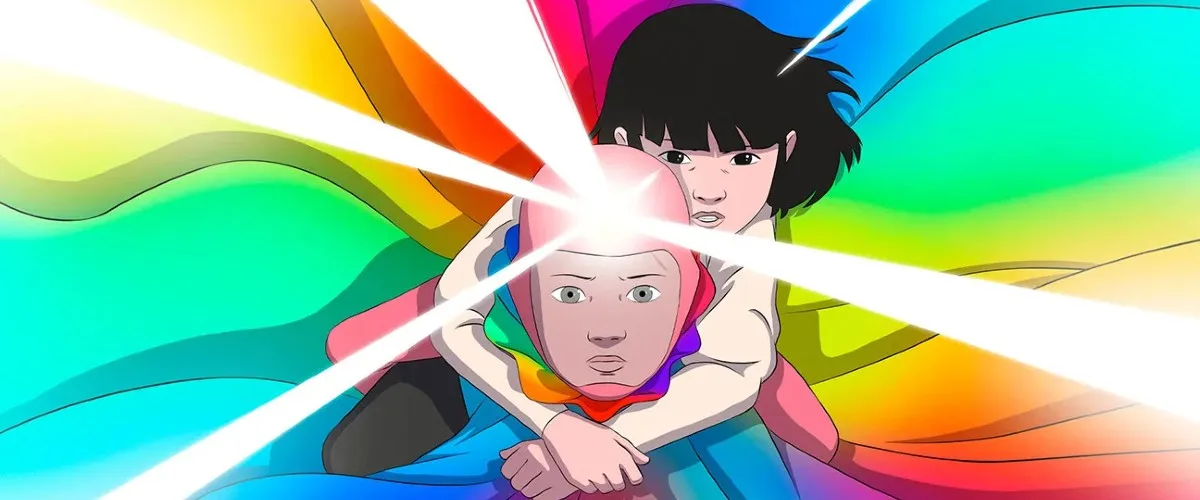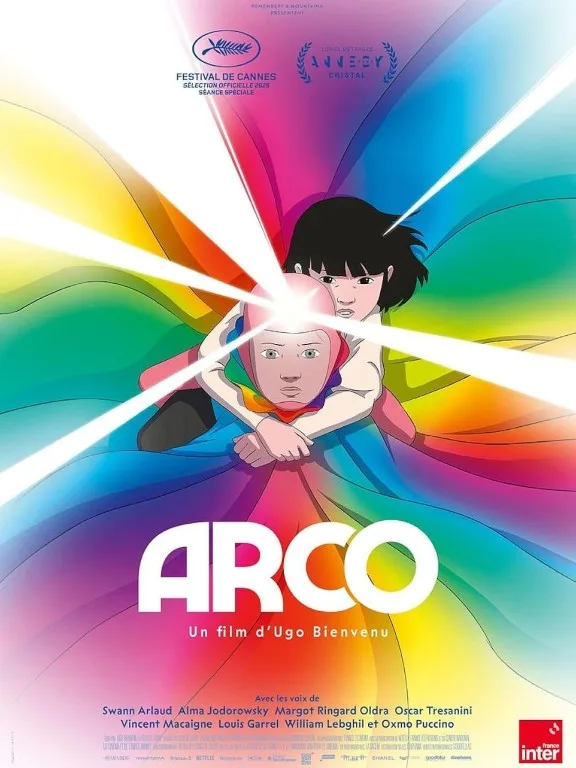What if a rainbow, arcing overhead, was simply the trail of a time traveler passing through, from one generation to another, iridescent as any proof of a brighter tomorrow would be?
Such are the dazzling, almost impossibly optimistic questions posed by “Arco,” a French animated film that most surprises through its decision to show us an idyllic fantasy future—full of colonies in the clouds, populated by families that treasure one another—but still, diplomatically, set its main action in our decidedly more imperfect near-present.
For what it’s worth, the young protagonist of French comics artist Ugo Bienvenu’s first animated feature does not intend to travel back to the year 2075, where certain world events—robots taking over human tasks, suburbs evolving into fireproof domes, ecological crisis worsening—have left humanity about as isolated as one might anticipate from reading even today’s headlines.
Living a millennium later in an arboretum-like home in the sky with his parents and older sister, who don rainbow-styled robes to visit time periods and learn about other eras of life on Earth, 10-year-old Arco is simply restless enough to explore (he still has two years to go until he can legally join their voyages) that he sneaks past his family—asleep in anti-gravitational pods—and steals his sister’s time-traveling costume to go see dinosaurs. It doesn’t go as planned, and he loses control.
Crash-landing in a forest, young Arco has the good fortune to encounter Iris, a girl his age, who takes him in. There’s an immediate joy and curiosity to their initial meeting, something warm beyond words. Iris lives with a nanny bot named Mikki, programmed by her parents—only accessible via video hologram—to help raise her and her baby brother, and she leaps at the chance to make a real friend, especially one who looks at her world so curiously.
Trapped in a past where he doesn’t belong, Arco promises Iris that the ecologically ravaged present she’s living in will one day cede to a new golden age that only seems like science fiction (though he’s hesitant to reveal too much about himself, or the future he comes from, for fear of stepping on any metaphorical butterflies). Sharing abilities that, to him, feel quite natural, he teaches Iris how to mimic birdsong; in return, she helps him blend in as they hunt for the refracting forehead gem that will allow him to time-travel.
The friendship that forms between them is carefully observed by Mikki, whose circuitry contains cultural memories and parental instincts as well as more practical calculations, as well as by a friendly neighbor who’s skeptical that Arco is indeed the cousin Iris introduces him as. But with a wildfire bearing down on their area, the pair’s efforts to return Arco to his time soon take on greater urgency.
At once innocent and resilient in their connection, despite the perilous situations they find themselves in, the bravery of our protagonists is complemented by the consummate decency of all those who factor into Bienvenu’s narrative, from the robot who cares for Iris, Arco, and her brother to a bumbling trio of misfit brothers who’ve become reclusive conspiracy theorists—albeit harmless, maybe even heroic ones—in their desperation to prove the existence of “rainbow people” they think they witnessed decades prior.
Though Bienvenu is French, the film’s lead characters—Arco and Iris—are together arcoiris, the Spanish word for “rainbow.” This allusion to colors in the sky, and the transformative possibilities they can reflect, is throughout “Arco” a symbol of elemental and cultural exchange, of children born worlds apart who still illuminate one another as naturally—and exquisitely—as sunlight interacting with water droplets.
Visually, “Arco” is pleasingly, gently prismatic, if never quite groundbreaking. Indeed, the film conveys a sense of simplicity through its hand-drawn, two-dimensional style. Co-written with Félix de Givry, Bienvenu has made the type of animated adventure that recalls not only Hayao Miyazaki’s emotional, environmental fables—to which “Arco” will be most adamantly compared; it shares a resonance with “Ponyo”—but also the works of French artists and cartoonists like René Laloux and Jean Giraud (better known as Moebius). One senses, also, the influence of Makoto Shinkai, whose poignant anime features—like “Your Name” and “Suzume”—similarly distill hope by bringing characters together across extraordinary distances.
The rainbow robes worn by Arco and his family members transport him to another time. Still, Bienvenu’s film often suggests that conditions for a society’s utopian growth and renewal first take root in individuals and their capacity for collaboration and trust, rather than in any purely collective or technological breakthrough. Ultimately, this is a film about the power of friendship, about the fruits it can bear; on that level, “Arco” often feels the best type of children’s film. It doesn’t condescend to its audience, nor does it short-change the truth of our world and its troubles. (On the contrary, the consequences faced by these characters are at times jarringly real.)
But “Arco” also refuses to insult a child’s intelligence by closing off the possibility that friendship can foster great ingenuity. After all, what is ingenuity, if not the channeling of hope and belief into a realization of potential? What is it if not the kind of human-made miracle we need to encourage our children to believe in?
“Arco” premiered as a special screening at this year’s Cannes Film Festival, before Neon acquired it and prepared an English-dubbed version of the film—with a star-studded cast including Natalie Portman (who produced the film) along with Will Ferrell, America Ferrera, Flea, Mark Ruffalo, and Andy Samberg—that did surprisingly little to enhance my experience of its narrative. The original voice cast, led by Oscar Tresanini and Margot Ringard Oldra, evoked a more resonant sense of innocence and joy, which such familiar voice actors can’t quite echo.
The cross-cultural exchange at the heart of “Arco” brings about a better world for its characters in part because they’re challenged by circumstance to dream in other languages, to communicate in unfamiliar ways, to pursue imperatives other than their own—given this lovely theme, along with the globalized flavor of Bienvenu’s retro-futurist aesthetic, one questions the need for an English dub. (Relatedly, listening to Flea squabble with Samberg is a niche amusement in a movie so cohesively enchanting as to have little need for them.)
Again, it doesn’t get much better than this film’s tagline: “What if rainbows were people from the future traveling in time?” I want to live in a world willing to entertain the wondrous implications of such a colorful sentiment. With its emanant sense of imaginative potential, Arco encourages you, for a time, to believe.
“Arco” is in select theaters Nov. 14, via Neon, for a one-week award-qualifying engagement before returning to theaters for a wider release in January.




















